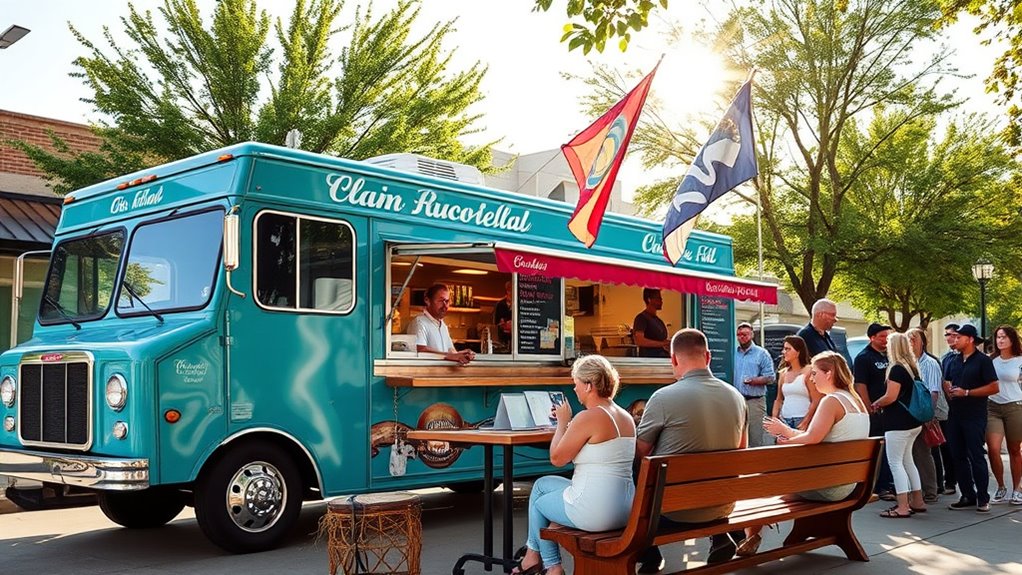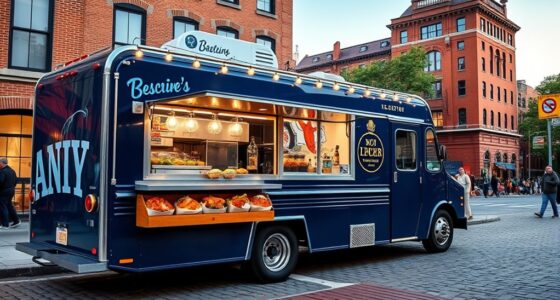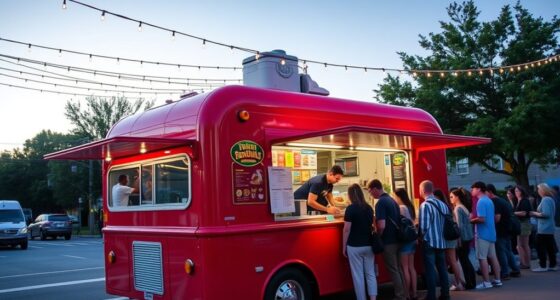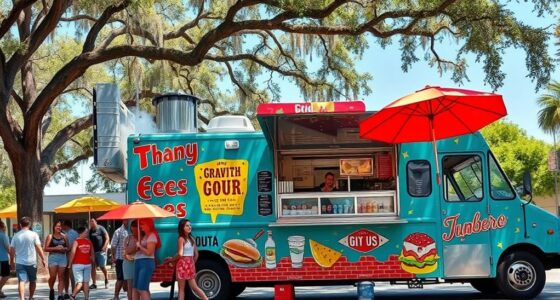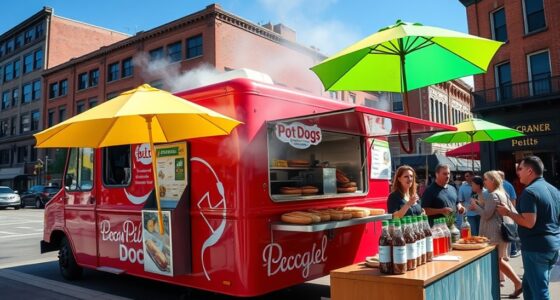Starting a food truck in Huntsville, AL, means understanding local regulations, securing permits, and selecting designated zones for operation. Focus on creating a strong brand with eye-catching design and a menu that highlights local flavors. Build community ties through partnerships, participate in festivals, and implement loyalty programs to attract customers. Proper budgeting, insurance, and efficient technology will keep you compliant and running smoothly. Keep exploring to discover more tips for launching and growing your food truck business exactly in Huntsville.
Key Takeaways
- Research Huntsville’s local food scene, regulations, and designated zones for food truck operations.
- Obtain necessary permits, licenses, and insurance through online applications and ensure compliance.
- Develop a unique, locally inspired menu optimized for cost and customer appeal.
- Budget for vehicle purchase, equipment, permits, and ongoing expenses, exploring small business funding options.
- Build a strong brand and community presence through eye-catching branding, participation in festivals, and customer engagement.
Local Food Scene Overview
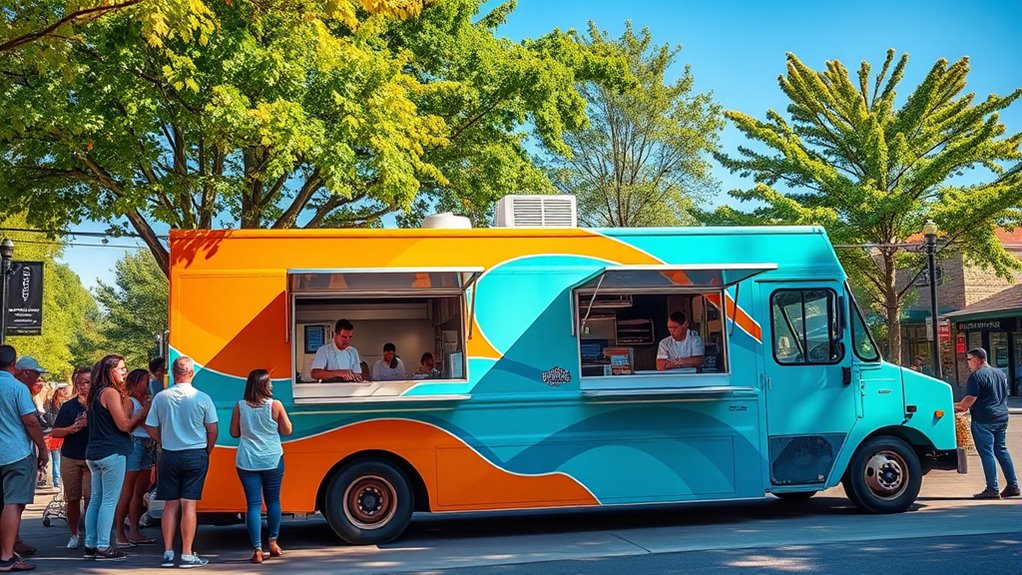
Curious about what makes Huntsville’s food scene stand out? You’ll find it’s a vibrant mix of innovative flavors and a strong community vibe. Food truck branding plays a pivotal role here, helping your truck catch eyes and build a loyal following. With menu customization, you can tailor your offerings to local tastes or experiment with unique dishes, setting you apart from competitors. Huntsville residents appreciate fresh, creative options, so your ability to adapt and showcase your brand through eye-catching design and personalized menus gives you a real advantage. The city’s diverse food culture encourages entrepreneurs to bring their own flavor to the table, making it an exciting place to start a food truck. Your creativity and understanding of local preferences can truly make your venture stand out. Proper airless sprayer maintenance is essential for ensuring your equipment operates smoothly as you prepare and serve your culinary creations.
Understanding Local Requirements
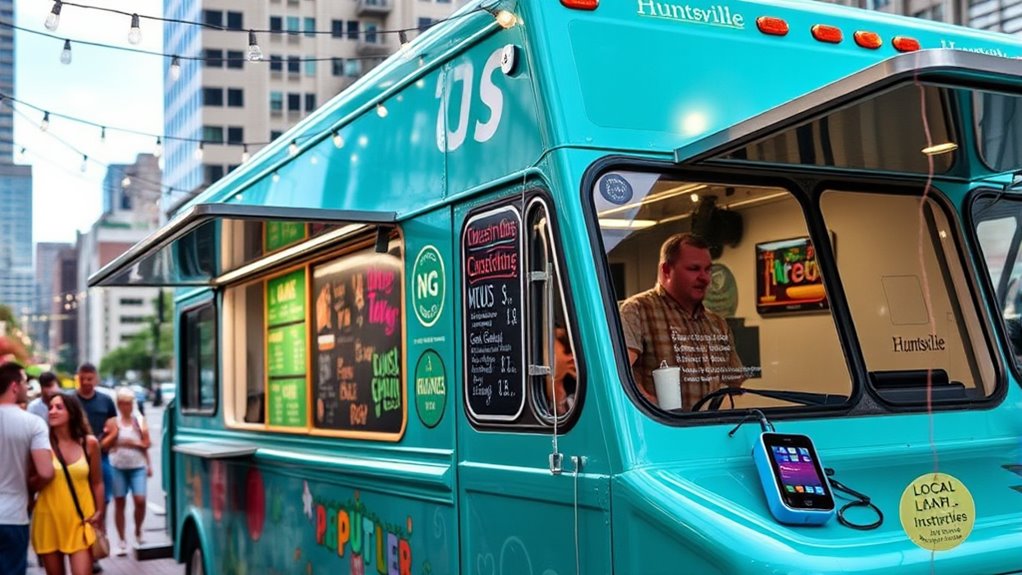
To get your food truck up and running in Huntsville, you’ll need to understand the local requirements. This includes steering through online permit application portals, meeting sanitation and record-keeping standards, and knowing where you can park in designated food truck zones. Staying informed guarantees you stay compliant and avoid unnecessary delays. Additionally, understanding the importance of proper food safety practices can help prevent health issues and ensure a smooth operation.
Online Permit Application Portals
Navigating the online permit application portals is a crucial step in starting your food truck in Huntsville. These digital licensing platforms streamline the process, allowing you to submit documents and track your application efficiently. To get started, familiarize yourself with the specific online permit portals used by local agencies. Here are three key steps:
- Visit the official city or county website to locate the digital licensing portal.
- Create an account and gather all necessary documentation for your food truck permit.
- Complete the online application forms accurately, attaching required files.
Using these online permit portals helps ensure your application moves smoothly and reduces processing time. Remember, understanding how to navigate these portals is essential for compliance and timely approval of your food truck permit in Huntsville.
Sanitation and Record-Keeping Requirements
Understanding the sanitation and record-keeping requirements in Huntsville is essential to keep your food truck compliant with local health regulations. Ensuring proper food safety practices helps prevent contamination and protects your customers. You’ll need to maintain detailed records of food temperatures, cleaning schedules, employee health logs, and supplier invoices. Accurate record management demonstrates your commitment to hygiene and can be vital during inspections. Regularly disinfect surfaces, store food at appropriate temperatures, and follow safe handling procedures. Keep all documentation organized and easily accessible. By prioritizing sanitation and thorough record-keeping, you not only meet local health standards but also build trust with your customers and health officials. Staying diligent in these areas supports your long-term success in Huntsville’s vibrant food truck scene.
Designated Food Truck Zones
Knowing where you can park and operate your food truck is essential for compliance in Huntsville. The city designates specific food truck zones to ensure safety and smooth operations. These zones are tailored to support your food truck design and mobile kitchen setup, making it easier to serve customers legally. To avoid fines or delays, familiarize yourself with local regulations and designated areas.
Here are key points to contemplate:
- Confirm permitted zones with city zoning authorities before parking your mobile kitchen setup.
- Reserve spots in advance if required, especially during busy hours or events.
- Ensure your food truck design adheres to zone-specific requirements, including distance from other businesses or residential areas.
Staying within designated zones guarantees legal operation and helps you build a strong local presence.
Setting Up Your Base of Operations
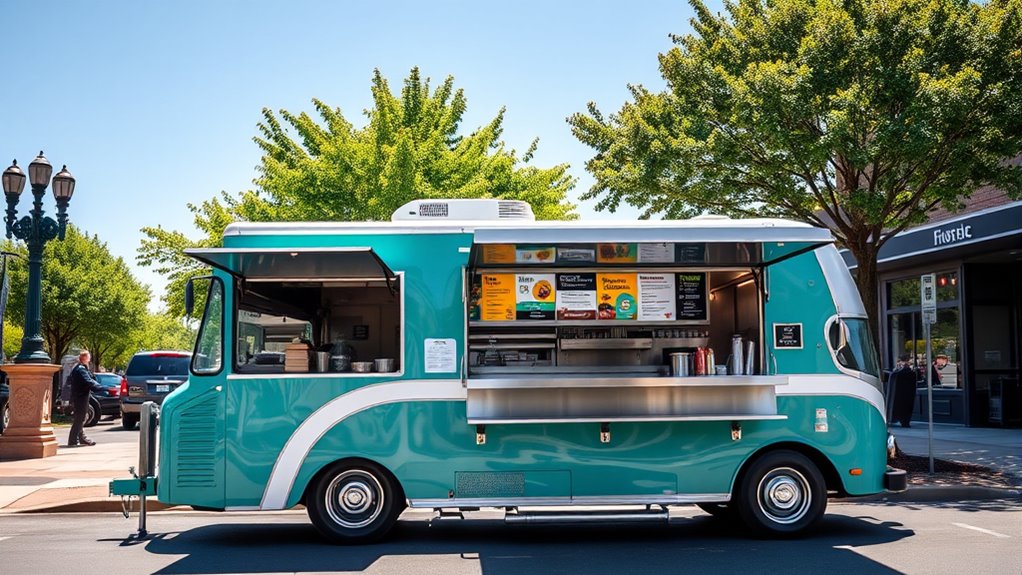
When setting up your base, you’ll need to understand shared kitchen licensing rules to stay compliant. Planning your kitchen layout carefully guarantees efficiency and meets health standards. By addressing these points early, you’ll create a solid foundation for your food truck operation. Additionally, considering kitchen customization options can help optimize your space for both safety and productivity.
Shared Kitchen Licensing Rules
Setting up your food truck’s base of operations often involves obtaining the appropriate shared kitchen license, which is essential for legal compliance and smooth operations. Understanding shared kitchen licensing and food truck co-op regulations helps guarantee you meet local requirements. To get started:
- Verify that the shared kitchen complies with Huntsville’s food safety standards and licensing rules.
- Ensure the facility is approved for food truck co-op regulations, allowing multiple vendors.
- Complete all necessary documentation and inspections to secure your shared kitchen license.
Custom Kitchen Layout Planning
Designing your custom kitchen layout is a crucial step to guarantee your food truck operates efficiently and safely. Focus on custom kitchen ergonomics to ensure everything is within easy reach, reducing fatigue and increasing productivity. Use layout zoning strategies to separate prep, cooking, and cleaning areas, which helps streamline workflow and maintain food safety standards. Consider the placement of appliances, storage, and workstations to minimize movement and maximize space utilization. Think about how staff will move through each zone and adjust accordingly to prevent congestion. Clear pathways and logical flow are essential, so your team can work smoothly during busy hours. Proper planning in these areas will lead to a more efficient, compliant, and profitable food truck operation.
Budgeting and Financing Your Food Truck
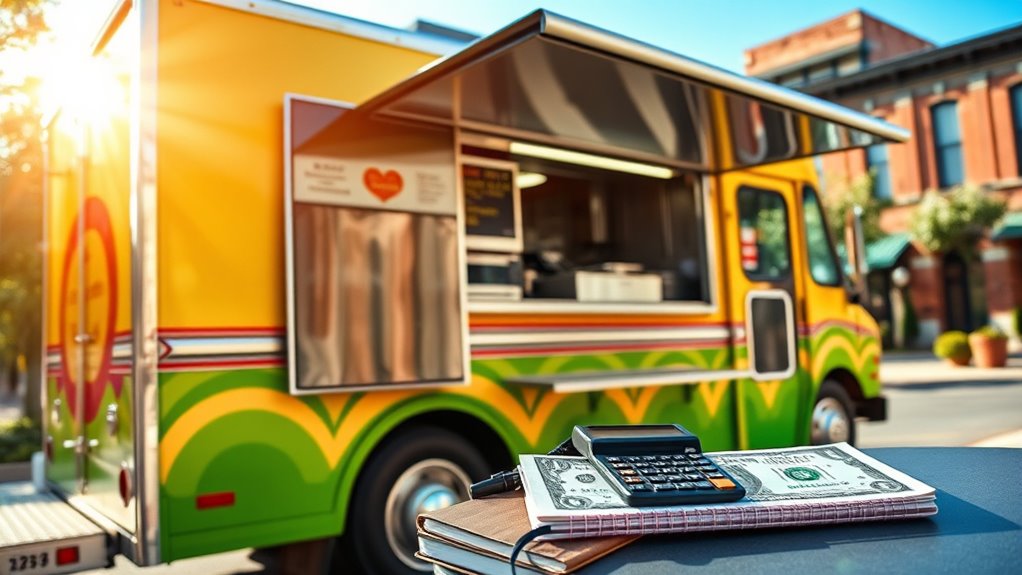
To get your food truck off the ground, you need to consider the costs of the vehicle and essential equipment. Exploring small business loan programs can help cover these expenses, but you’ll also need to plan for liability insurance requirements. Budgeting carefully now ensures you’re prepared for the financial responsibilities ahead. Utilizing efficient general ledger coding practices can also help you track expenses and manage cash flow more effectively.
Initial Vehicle and Equipment Costs
Starting your food truck venture requires a clear understanding of initial vehicle and equipment costs. Your vehicle is the foundation, and expenses include purchasing or leasing it, plus necessary vehicle maintenance to keep it running smoothly. Equipment costs cover cooking appliances, refrigeration, and serving tools. Budgeting for equipment upgrades is essential to guarantee efficiency and meet health standards.
Here are key costs to take into account:
- Vehicle purchase or lease, including initial vehicle maintenance
- Commercial kitchen equipment, such as ovens, grills, and refrigerators
- Upgrades for better performance or branding, like custom wraps or advanced cooking tools
Careful planning for these costs helps you avoid surprises and ensures your truck is ready to serve in Huntsville’s competitive market.
Small Business Loan Programs
Securing the right funding can make a significant difference in launching and growing your food truck business in Huntsville. Small business loan programs offer diverse funding options tailored to new entrepreneurs like you. These programs often provide low-interest rates and flexible repayment terms, easing your financial burden. To access these funds, you’ll need to complete a loan application that highlights your business plan, financial projections, and creditworthiness. Local banks, credit unions, and government-backed lenders are good starting points for applying. Be prepared to demonstrate how the loan will help cover startup costs, including vehicle purchase, equipment, and permits. Carefully compare your options to find the best fit for your needs, ensuring your food truck venture is financially sound from the outset.
Liability Insurance Requirements
Liability insurance is a essential expense to contemplate when budgeting and financing your food truck in Huntsville. Ensuring insurance compliance is crucial to avoid fines or delays in your business startup. Liability coverage protects you from claims related to property damage, injuries, or accidents involving your truck. Without proper coverage, you risk significant financial loss.
Here are three key points to consider:
- Verify local and state requirements for liability insurance to meet licensing standards.
- Choose a policy that offers comprehensive liability coverage tailored to food trucks.
- Budget for ongoing premiums to maintain insurance compliance as your business grows.
Securing the right liability insurance safeguards your investment while keeping your food truck operational and compliant with Huntsville regulations.
Designing Your Menu and Pricing Strategy
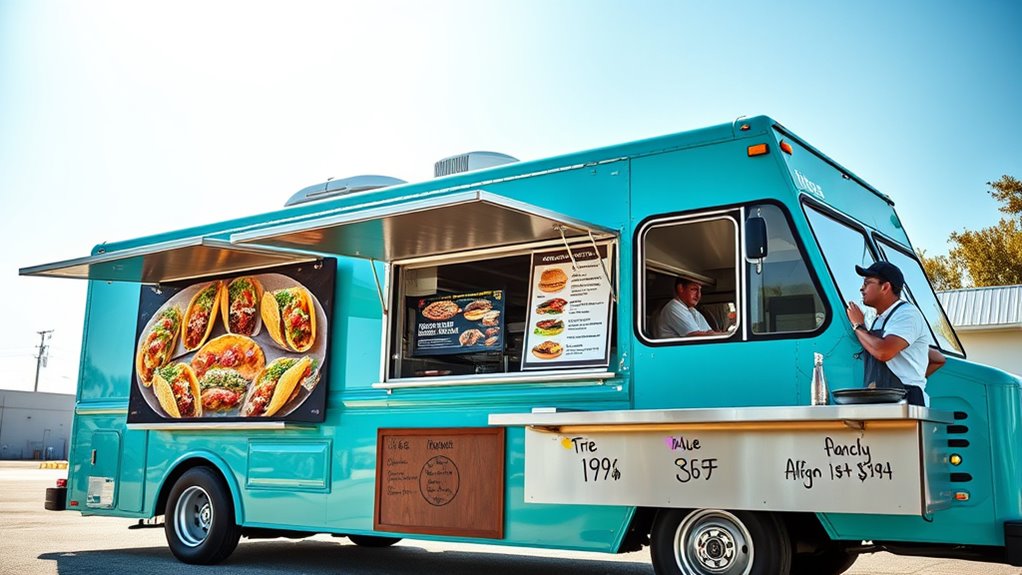
When designing your menu, focus on creating locally inspired dishes that resonate with Huntsville’s community. Use ingredient cost optimization techniques to keep your prices competitive without sacrificing quality. This approach helps you attract customers and build a loyal following. Incorporating dynamic communication exercises into your team interactions can also enhance customer service and teamwork.
Crafting Locally Inspired Dishes
Creating a menu that highlights locally inspired dishes starts with understanding your community’s unique flavors and ingredients. To craft locally, focus on dishes inspired by Huntsville’s rich agricultural and cultural heritage. Consider seasonal produce, regional spices, and local meats to create a menu that resonates. Here are some ideas:
- Incorporate ingredients from local farms to highlight freshness and authenticity.
- Develop signature dishes that tell a story of Huntsville’s history or culture.
- Price your dishes competitively, reflecting both ingredient costs and local market preferences.
Ingredient Cost Optimization Techniques
Designing your menu and pricing strategy to optimize ingredient costs requires a strategic approach that balances quality with affordability. Focus on ingredient sourcing to find reliable suppliers offering competitive prices without sacrificing freshness. Regularly compare vendors to ensure you’re getting the best deals. Incorporate bulk purchasing whenever possible, as buying ingredients in larger quantities reduces per-unit costs and minimizes waste. Streamlining your menu by choosing versatile ingredients can also lower expenses, allowing you to create multiple dishes without extra inventory. Consider seasonal and local ingredients to take advantage of lower prices and fresher options. By carefully planning your menu and leveraging bulk purchasing, you can keep ingredient costs manageable, improve profit margins, and offer affordable yet high-quality food to your customers.
Technology and Operations
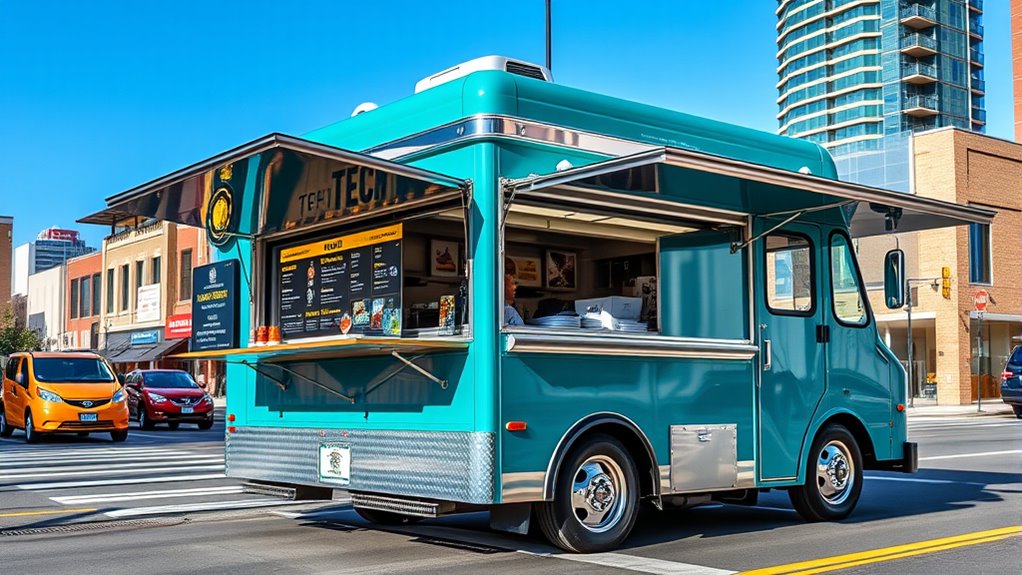
You need reliable technology to keep your food truck running smoothly, like mobile card readers that work seamlessly with your devices. Implementing a real-time stock tracking system helps you avoid shortages and manage inventory efficiently. These tools guarantee your operations stay organized and responsive, so you can focus on serving your customers.
Mobile Card Reader Compatibility
Ensuring your mobile card reader is compatible with your food truck’s technology is vital for smooth transactions and customer satisfaction. When choosing a device, consider how well it supports mobile payment options and integrates with your existing systems. Compatibility issues can cause delays and frustration, so verifying device specs before purchase is essential.
Here are three key points to keep in mind:
- Confirm that the card reader supports popular mobile payment methods like Apple Pay, Google Pay, and Samsung Pay.
- Check that it seamlessly integrates with your point-of-sale system and mobile devices.
- Ensure the device is compatible with your smartphone or tablet’s operating system (iOS or Android).
Prioritize card reader compatibility to keep transactions quick and customer-friendly.
Real-Time Stock Tracking System
Implementing a real-time stock tracking system is essential for maintaining efficient operations and satisfying customers. With accurate inventory management, you can monitor stock levels instantly, preventing shortages or overstocking. This technology streamlines supply chain logistics, allowing you to reorder ingredients automatically when supplies run low. By tracking sales and inventory simultaneously, you gain better insight into popular items and seasonal trends. This helps optimize purchasing decisions, reduce waste, and improve profitability. Additionally, a real-time system minimizes manual errors and administrative tasks, freeing you up to focus on delivering quality food and excellent service. Overall, integrating real-time stock tracking enhances your food truck’s operational efficiency, ensures consistent product availability, and keeps your customers happy.
Marketing and Growing Your Presence
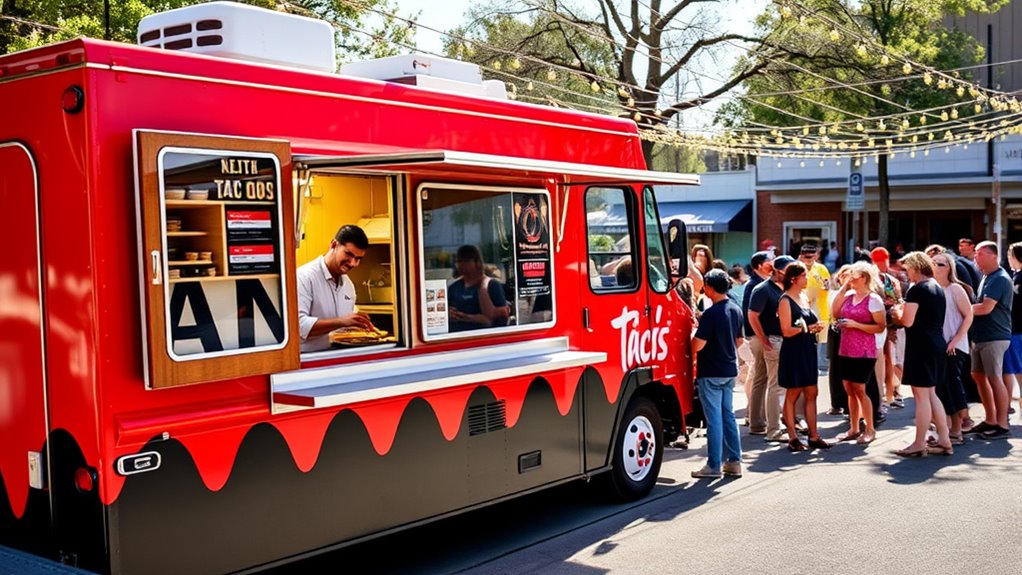
Participating in popular local food festivals is a great way to boost your visibility and attract new customers. You can also encourage repeat business by offering customer loyalty programs that reward frequent visitors. Together, these strategies help you grow your presence and build a strong community around your food truck.
Popular Local Food Festivals
Attending popular local food festivals is one of the most effective ways to boost your food truck’s visibility and attract new customers. Cultural festivals and food truck rallies draw large crowds enthusiastic to try unique cuisine, making them perfect opportunities to showcase your offerings. Participating regularly helps you build brand recognition and connect with the community. To maximize your presence, consider these ideas:
- Join local cultural festivals to celebrate diversity and reach different audiences.
- Register for food truck rallies to gain exposure among food enthusiasts and industry insiders.
- Use festival opportunities to gather feedback and refine your menu based on customer preferences.
Customer Loyalty Programs
Customer loyalty programs are a powerful way to grow your food truck’s presence and keep customers coming back. By offering loyalty rewards, you encourage repeat visits and foster customer engagement. Consider implementing a punch card system or a digital app that tracks purchases and awards points. These programs make customers feel appreciated and incentivize them to choose your truck over competitors. Regularly update your rewards to keep interest high and offer exclusive deals for loyal patrons. Engaging with customers through loyalty programs also provides valuable feedback, helping you improve your offerings. The more you connect with your audience, the stronger your community becomes. Ultimately, loyalty rewards turn casual customers into brand advocates, fueling your growth and ensuring your food truck remains a favorite in Huntsville.
Local Partnerships Boost Visibility
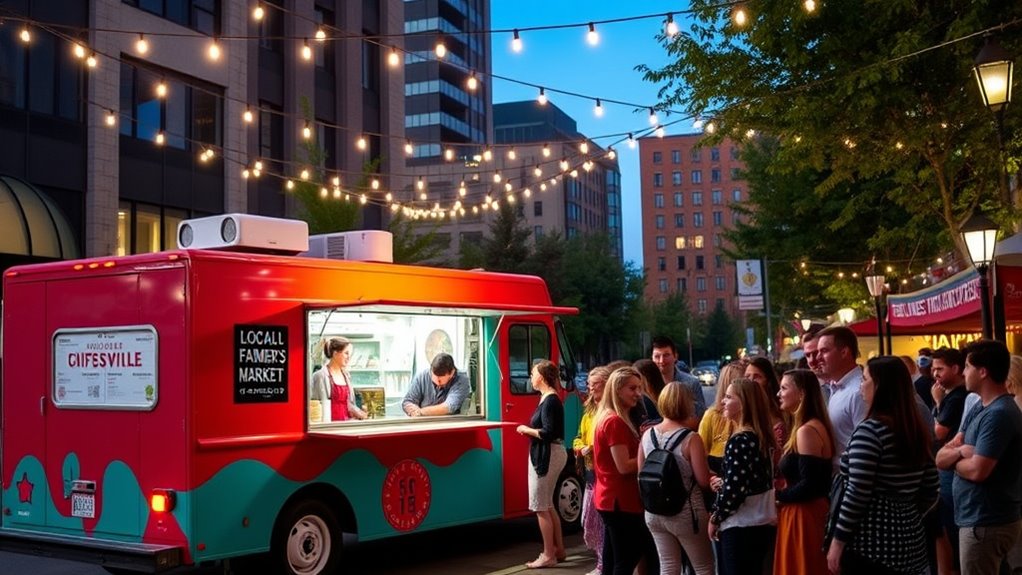
Local partnerships are essential for food trucks looking to stand out in Huntsville. By collaborating with local businesses, you can increase your visibility and foster community engagement. Partnering with nearby cafes, gyms, or event venues creates opportunities for cross-promotion and attracts diverse customers. Use social media outreach to highlight these partnerships, sharing joint promotions and community events. This not only boosts your presence online but also strengthens your ties within the local scene. Here are some ideas to get started:
- Collaborate with local breweries for joint events or tastings
- Offer special deals to employees of nearby offices or retail stores
- Sponsor or participate in community festivals and farmers’ markets
Building these relationships helps you grow your customer base and enhances your reputation in Huntsville.
Frequently Asked Questions
What Permits Are Required Specifically for Food Trucks in Huntsville?
You need to obtain food truck permits to operate in Huntsville, AL. Check Huntsville regulations, which require a mobile food vendor permit from the city’s health department and a business license. You might also need a fire safety inspection and possibly a parking permit if you plan to operate in specific areas. Make certain to review all local rules to ensure you’re compliant and avoid fines.
How Do I Find the Best Locations to Park My Food Truck?
To find the best spots, research high customer foot traffic areas like busy downtown streets, parks, or near office complexes. Use parking strategies such as rotating locations during different times or special events to attract diverse customers. Talk to local business owners or event organizers for permissions and insights. Monitoring daily foot traffic and adjusting your parking locations accordingly helps maximize visibility and sales for your food truck.
Are There Any Local Food Safety Testing Requirements?
Yes, you need to follow local food safety testing requirements in Huntsville. You must adhere to food safety protocols, which include regular testing of your food products. You can find approved testing laboratories through the Alabama Department of Public Health, ensuring your truck meets all health standards. Staying compliant helps protect your customers and keeps your food truck operating smoothly without any legal issues.
What Are the Most Popular Food Truck Cuisines in Huntsville?
In Huntsville, popular food truck cuisines include gourmet tacos, barbecue, and fusion dishes, reflecting diverse customer demographics. You should analyze food truck menu trends and customer demographics to tailor your offerings. Focus on fresh, innovative options that appeal to locals and visitors alike. By understanding what’s trending and who your customers are, you can craft a menu that stands out and attracts a loyal following in the Huntsville food scene.
How Can I Connect With Local Food Truck Events or Festivals?
You can connect with local food truck events or festivals by joining Huntsville’s local food truck associations, which often share upcoming events and networking opportunities. Keep an eye on social media pages and community boards for announcements. Additionally, explore event sponsorship opportunities, as they help you gain exposure and build relationships within the local food scene. Attending these events actively will help you establish a strong presence and attract more customers.
Conclusion
Starting a food truck in Huntsville, AL, is like finding the Holy Grail of food ventures. With a little planning, creativity, and some good ol’ elbow grease, you’ll be serving up delicious eats and building a loyal following. Remember, even the legendary Lewis and Clark faced challenges—so trust your journey and adapt as you go. Before you know it, your food truck will be the talk of the town, a true treasure in Huntsville’s vibrant scene.
